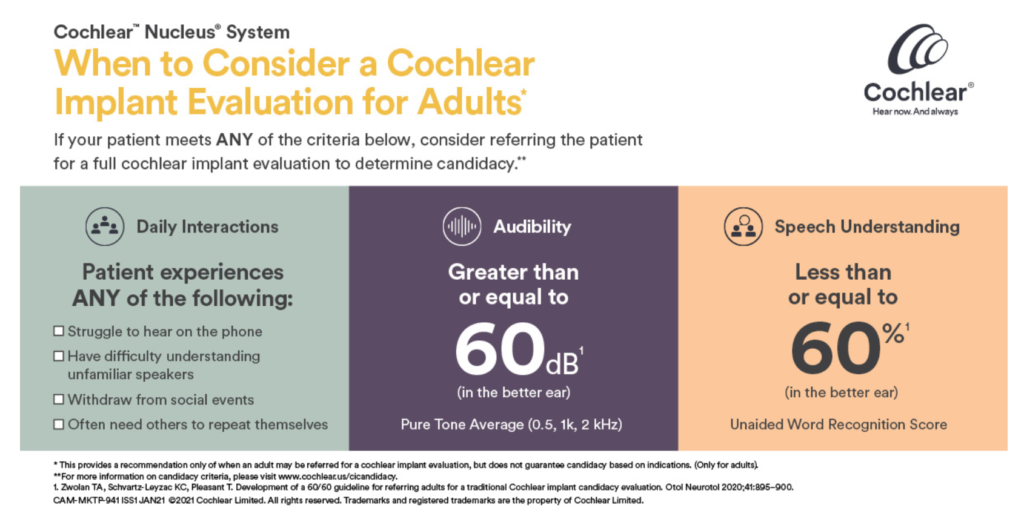International Consensus Paper
The world’s first international consensus on cochlear implant treatment for adults was published in JAMA Otolaryngology.1 The paper was authored by 31 hearing experts assisted by cochlear implant user and professional advocacy organizations. The publication is a major step forward in clarifying when cochlear implants (CI’s) are a treatment option for adults and a timely call to policymakers, insurance funding bodies as well as health professionals to better understand the importance of providing access to CI treatment for those who could benefit.
Read about the first global consensus on the use of cochlear implants for the management of bilateral moderate to profound or moderate sloping to profound hearing loss in adults was published online on August 27, 2020 in JAMA Otolaryngology Head and Neck Surgery.
2. Journal Club – Standard of Care: International Consensus Paper
Check out this International Consensus Paper article review written by Dr. Brian Kaplan, Senior Vice President of Clinical Strategy & Innovation at Cochlear.
60/60 Guideline
Zwolan et al recommends that patients be considered for a cochlear implant candidacy evaluation (CICE) if they obtain a score less than or equal to 60% correct on an unaided monosyllabic word test in the better ear and if they demonstrate a PTA greater than or equal to 60 dB HL.2 The group is hopeful that this simple guideline will result in an increase in the number of patients who are referred for a traditional cochlear implant candidacy evaluation.
This course focuses on the methodology and findings from a recent international systematic review and consensus process, establishing a standard of care for the treatment of adult patients with unilateral cochlear implant for bilateral severe, profound, or moderate sloping to profound sensorineural hearing loss. It also includes a review of “Terry Zwolan et al Development of a 60/60 Guideline for Referring Adults for a Traditional Cochlear Implant Candidacy Evaluation. Otology & Neurotology: April 20, 2020.”
Read this journal club article discussing the new 60/60 Guideline and its importance.
5. New considerations for recommending a cochlear implant evaluation
Traditionally, cochlear implants have been considered a treatment option only for those who have lost all of their hearing. Read how the new 60/60 Guideline may change that.

Join this webinar series to learn more!
- Craig A. Buchman, et al., Unilateral Cochlear Implants for Severe, Profound, or Moderate Sloping to Profound Bilateral Sensorineural Hearing Loss. A Systematic Review and Consensus Statements. JAMA Otolaryngol Head Neck Surg. doi:10.1001/ jamaoto.2020.0998 Published online August 27, 2020 ** Commentary and suggested implications is the work of the authors of the summary. EURO-CIU GLOBAL GUIDELINES ON STANDARDS OF CARE FOR ADULT COCHLEAR IMPLANTATION, Sue Archbold, Brian Lamb and Leo De Raeve.
- Zwolan, Teresa A.; Schvartz-Leyzac, Kara C.; Pleasant, Terrence Development of a 60/60 Guideline for Referring Adults for a Traditional Cochlear Implant Candidacy Evaluation, Otology & Neurotology: April 20, 2020 – Volume Publish Ahead of Print – Issue – doi: 10.1097/MAO.0000000000002664


